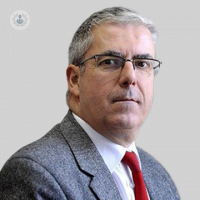Psoriasis: who does it affect and what are the latest treatments?
Written in association with:Psoriasis is a skin disorder that affects approximately 2% of the population in the UK. While there is no cure for it, there is a range of treatments that can help control it.
Professor Andrew Leslie Wright, a leading consultant dermatologist in Bradford and Leeds, discusses how psoriasis is treated, who it predominately affects and what are the latest advancements in treatments.

What is psoriasis?
Psoriasis is caused by an inflammation of the skin and affects approximately 2% of the population in the UK. Rashes commonly appear on the scalp, hands and feet, elbows and knees but can occur on any part of the body. It can be linked with changes in joints.
Who develops psoriasis?
Almost anybody can develop the condition but it does run in families, and there is often a family history in close relatives. It can appear at any time of life but the commonest age of appearance is in the 20-30 and 50-60 age groups. Males and females are equally affected. Once it has appeared it may remain, having a very variable but long term course and even if it clears is more likely to recur.
What triggers psoriasis?
Certain things can either precipitate or exacerbate psoriasis. These include stress, skin injury, infection and reactions to medications.
How is psoriasis treated?
As far as treatment is concerned, in the past topical treatments were messy and included the use of tar-based preparations. However, there are now several easy to use creams and ointments that can be very effective. If these treatments fail then other options include:
- Ultraviolet light treatment which is usually done at the hospital as an outpatient
- A variety of tablet treatments many of which require close hospital monitoring
- The most recent introduction of injection treatments which can be very effective at controlling the condition
Psoriasis can be made worse by a non-specific skin injury so general skincare, especially wearing gloves for housework, DIY and hard manual work is important, as is general skincare with the regular use of moisturisers. Many patients with psoriasis will need to visit a health care professional on a relatively regular basis to discuss and modify their treatment.
Are there any psychological effects of psoriasis?
Psoriasis can be a very distressing condition, the appearance of the skin is embarrassing and although there is no reason to avoid any particular sporting or social activities, many patients with psoriasis feel embarrassed to take part in sports such as swimming and go to the gym.
There are good support groups for psoriasis including the Psoriasis Association who can help to support, advise and educate patients with this chronic condition.
What is the latest treatment for psoriasis?
The general outlook for the future of psoriasis looks bright. Many of the newer treatments, including the injectable monoclonal antibody treatments are extremely successful in bringing the condition under control, however, there are still some worries about longterm safety of these medications. As such, at the moment they are reserved for patients with significant disease that is difficult to manage in other ways.
Current research performed over the last few years has enabled a much greater understanding of the way psoriasis appears and how it occurs and there will likely be great advances in its treatment over the next few years.
If you have psoriasis and would like to see a top dermatologist, visit Professor Andrew Leslie Wright’s Top Doctors profile and book a consultation with him.



